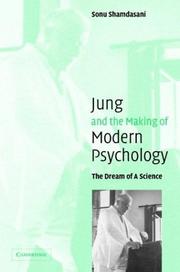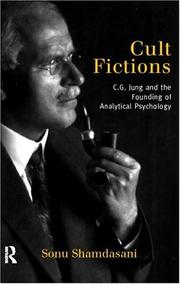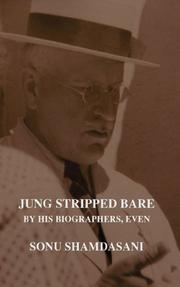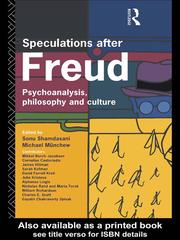| Listing 1 - 10 of 41 | << page >> |
Sort by
|

ISBN: 9780521831451 9780511490095 9780521539098 0521831458 0521539099 0511490097 0511078811 9780511078811 0511075707 9780511075704 0511077246 9780511077241 0511169728 9780511169724 1107139139 9781107139138 1280421797 9781280421792 0511205767 9780511205767 0511308515 9780511308512 Year: 2005 Publisher: Cambridge Cambridge University Press
Abstract | Keywords | Export | Availability | Bookmark
 Loading...
Loading...Choose an application
- Reference Manager
- EndNote
- RefWorks (Direct export to RefWorks)
Occultist, Scientist, Prophet, Charlatan - C. G. Jung has been called all these things and after decades of myth making, is one of the most misunderstood figures in Western intellectual history. This book is the first comprehensive study of the origins of his psychology, as well as providing a new account of the rise of modern psychology and psychotherapy. Based on a wealth of hitherto unknown archival materials it reconstructs the reception of Jung's work in the human sciences, and its impact on the social and intellectual history of the twentieth century. The book creates a basis for all future discussion of Jung, and opens new vistas on psychology today.
Jung, Carl Gustav --- Psychoanalysis. --- Jungian psychology. --- Jung, C. G., --- Analytic psychology --- Analytical psychology --- Jungian psychoanalysis --- Jungian theory --- Psychoanalysis --- Psychology --- Psychology, Pathological --- Jung, C. G. --- Jung, Karl Gustav, --- I︠U︡nh, Karl Hustav, --- Jung, Carl Gustav, --- Yung, Ḳ. G. --- Yungu, C. G. --- I︠U︡ng, Karl Gustav, --- יונג, קרל גוסטאב --- יונג, קרל גוסטב --- יונג, ק. ג. --- 榮格, --- C. G. ユング, --- Yūng, Kārl Gustāv, --- يونگ، کارل گستاو --- Health Sciences --- Psychiatry & Psychology

ISBN: 9786610073351 1280073357 1134664621 0203360761 0203377524 9780203360767 0415186137 0415186145 9781134664573 9781134664610 9781134664627 9780415186131 9780415186148 1134664613 661007335X 9781280073359 9780203377529 Year: 1998 Publisher: London New York Routledge
Abstract | Keywords | Export | Availability | Bookmark
 Loading...
Loading...Choose an application
- Reference Manager
- EndNote
- RefWorks (Direct export to RefWorks)
Shamdasani looks into the documentary evidence for Richard Noll's claims that Jung was a would-be prophet around whom followers gathered in a hero cult. Drawing on archive material, he shows that Noll's claims are not well founded.
Psychoanalysis. --- Jungian psychology. --- Analytic psychology --- Analytical psychology --- Jungian psychoanalysis --- Jungian theory --- Psychoanalysis --- Psychology --- Psychology, Pathological --- Jung, C. G. --- Jung, Karl Gustav, --- I︠U︡nh, Karl Hustav, --- Jung, Carl Gustav, --- Yung, Ḳ. G. --- Yungu, C. G. --- I︠U︡ng, Karl Gustav, --- יונג, קרל גוסטאב --- יונג, קרל גוסטב --- יונג, ק. ג. --- 榮格, --- C. G. ユング, --- Yūng, Kārl Gustāv, --- يونگ، کارل گستاو --- Jung, Carl Gustav

ISBN: 0429901119 0429476345 1283249081 9786613249081 1849404526 9781849404525 1855753170 9781855753174 9780429476341 9781283249089 6613249084 Year: 2005 Publisher: London New York Karnac
Abstract | Keywords | Export | Availability | Bookmark
 Loading...
Loading...Choose an application
- Reference Manager
- EndNote
- RefWorks (Direct export to RefWorks)
This book addresses continual controversies that rage over the biography of Jung and demonstrates how his life has become hijacked by covert cultural agendas, which seek to advance their claims by fictions served up as facts. It demonstrates the pitfalls and fallacies of such works, and sets out how his life and work should be approached on a historical basis, drawing on decades of archival investigation and new documentation. Thus this work lays out an agenda for future studies and discussions of Jung and of his impact on modern psychology and contemporary culture.
Book
Year: 1998 Publisher: New York London Routledge
Abstract | Keywords | Export | Availability | Bookmark
 Loading...
Loading...Choose an application
- Reference Manager
- EndNote
- RefWorks (Direct export to RefWorks)

ISBN: 1134902263 1134902271 1280182679 0203310594 0203049128 9780203049129 9781134902279 0415076552 0415076560 9780415076555 9780415076562 9781134902224 9781134902262 Year: 1994 Publisher: London New York Routledge
Abstract | Keywords | Export | Availability | Bookmark
 Loading...
Loading...Choose an application
- Reference Manager
- EndNote
- RefWorks (Direct export to RefWorks)
This collection of essays at the juncture between psychoanalysis, philosophy, and cultural studies questions the future of a discipline which has emerged from the intimate experience of therapy to exert a powerful hold over contemporary culture.
Psychoanalysis --- Psychoanalysis and philosophy --- Psychoanalysis and culture --- Culture and psychoanalysis --- Culture --- Philosophy and psychoanalysis --- Philosophy --- Psychology --- Psychology, Pathological --- Freud, Sigmund, --- Freud, Sigmund --- Congresses --- Philosophy&delete& --- Congresses.
Book
ISBN: 9780393088946 Year: 2013 Publisher: New York : W.W. Norton & Company,
Abstract | Keywords | Export | Availability | Bookmark
 Loading...
Loading...Choose an application
- Reference Manager
- EndNote
- RefWorks (Direct export to RefWorks)
With Jung’s Red Book as their point of departure, two leading scholars explore issues relevant to our thinking today.In this book of dialogues, James Hillman and Sonu Shamdasani reassess psychology, history, and creativity through the lens of Carl Jung’s Red Book. Hillman, the founder of Archetypal Psychology, was one of the most prominent psychologists in America and is widely acknowledged as the most original figure to emerge from Jung’s school. Shamdasani, editor and cotranslator of Jung’s Red Book, is regarded as the leading Jung historian. Hillman and Shamdasani explore a number of the issues in the Red Book―such as our relation with the dead, the figures of our dreams and fantasies, the nature of creative expression, the relation of psychology to art, narrative and storytelling, the significance of depth psychology as a cultural form, the legacy of Christianity, and our relation to the past―and examine the implications these have for our thinking today.
Book
ISBN: 1787357716 1787357724 Year: 2020 Publisher: London : University College London,
Abstract | Keywords | Export | Availability | Bookmark
 Loading...
Loading...Choose an application
- Reference Manager
- EndNote
- RefWorks (Direct export to RefWorks)
Medical Humanity and Inhumanity in the German-Speaking World is the first volume dedicated to exploring the interface of medicine, the human and the humane in the German-speaking lands. The volume tracks the designation and making through medicine of the human and inhuman, and the humane and inhumane, from the Middle Ages to the present day. Eight individual chapters undertake explorations into ways in which theories and practices of medicine in the German-speaking world have come to define the human, and highlight how such theories and practices have consolidated, or undermined, notions of humane behaviour. Cultural analysis is central to this investigation, foregrounding the reflection, refraction and indeed creation of these theories and practices in literature, life-writing and other discourses and media. Contributors bring to bear perspectives from literary studies, film studies, critical theory, cultural studies, history, and the history of medicine and psychiatry. Thus, this collection is historical in the most expansive sense, for it debates not only what historical accounts bring to our understanding of this topic. It encompasses too investigation of life-writing, documentary, and theory and literary works to bring to light elusive, paradoxical, underexplored - yet vital - issues in history and culture.
Medical ethics. --- Biomedical ethics --- Clinical ethics --- Ethics, Medical --- Health care ethics --- Medical care --- Medicine --- Bioethics --- Professional ethics --- Nursing ethics --- Social medicine --- Moral and ethical aspects
Book
ISBN: 9780393073676 039307367X Year: 2012 Publisher: New York W.W. Norton
Abstract | Keywords | Export | Availability | Bookmark
 Loading...
Loading...Choose an application
- Reference Manager
- EndNote
- RefWorks (Direct export to RefWorks)
Jung, Carl Gustav --- Jung, C. G. --- Jung, Karl Gustav, --- I︠U︡nh, Karl Hustav, --- Jung, Carl Gustav, --- Yung, Ḳ. G. --- Yungu, C. G. --- I︠U︡ng, Karl Gustav, --- יונג, קרל גוסטאב --- יונג, קרל גוסטב --- יונג, ק. ג. --- 榮格, --- C. G. ユング, --- Yūng, Kārl Gustāv, --- يونگ، کارل گستاو
Book
ISBN: 9781139206051 1139206052 9780511979842 0511979843 9781139204477 1139204475 9780521509909 0521509904 9780521729789 0521729785 9781139203067 1139199447 9781139199445 1107224101 9781107224100 1280563672 9781280563676 9786613597915 6613597910 1139205250 9781139205252 1139203061 9781139203067 1139201654 9781139201650 Year: 2012 Publisher: Cambridge Cambridge university press
Abstract | Keywords | Export | Availability | Bookmark
 Loading...
Loading...Choose an application
- Reference Manager
- EndNote
- RefWorks (Direct export to RefWorks)
"How did psychoanalysis attain its prominent cultural position? How did it eclipse rival psychologies and psychotherapies, such that it became natural to bracket Freud with Copernicus and Darwin? Why did Freud 'triumph' to such a degree that we hardly remember his rivals? This book reconstructs the early controversies around psychoanalysis and shows that rather than demonstrating its superiority, Freud and his followers rescripted history. This legend-making was not an incidental addition to psychoanalytic theory but formed its core. Letting the primary material speak for itself, this history demonstrates the extraordinary apparatus by which this would-be science of psychoanalysis installed itself in contemporary societies. Beyond psychoanalysis, it opens up the history of the constitution of the modern psychological sciences and psychotherapies, how they furnished the ideas which we have of ourselves and how these became solidified into indisputable 'facts'"-- "This book began in 1993 as an inquiry into Freud historians and their work. We had become aware of the upheavals that had affected Freud studies since the 1970s, which were completely transformating how one understood psychoanalysis and its origins. Intrigued by the new histories of the Freudian movement, we decided to interview the key players to gather their testimonies in a collective volume. These interviews were transcribed and annotated (we reproduce a few excerpts in the following), but the volume itself remained unfinished, for in the meantime our investigation had changed. Quite quickly, it became apparent that it was not possible to situate ourselves with the neutrality and ironic detachment that we had initially adopted. The stakes were too high, and too much remained to be researched and verified before one could attempt to pass judgment on the endless controversies around psychoanalysis. Instead of describing them from the outside, we became drawn in, and here put forward our own contribution to the history of the Freudian movement"--
Psychoanalysis --- History. --- Freud, Sigmund, --- Freud, Sigmund --- History --- Health Sciences --- Psychiatry & Psychology
Book
ISBN: 9781787357723 9781787357730 Year: 2020 Publisher: London: UCL Press,
Abstract | Keywords | Export | Availability | Bookmark
 Loading...
Loading...Choose an application
- Reference Manager
- EndNote
- RefWorks (Direct export to RefWorks)
Medical Humanity and Inhumanity in the German-Speaking World is the first volume dedicated to exploring the interface of medicine, the human and the humane in the German-speaking lands.The volume tracks the designation and making through medicine of the human and inhuman, and the humane and inhumane, from the Middle Ages to the present day. Eight individual chapters undertake explorations into ways in which theories and practices of medicine in the German-speaking world have come to define the human, and highlight how such theories and practices have consolidated, or undermined, notions of humane behaviour. Cultural analysis is central to this investigation, foregrounding the reflection, refraction and indeed creation of these theories and practices in literature, life-writing and other discourses and media.Contributors bring to bear perspectives from literary studies, film studies, critical theory, cultural studies, history, and the history of medicine and psychiatry. Thus, this collection is historical in the most expansive sense, for it debates not only what historical accounts bring to our understanding of this topic. It encompasses too investigation of life-writing, documentary, and theory and literary works to bring to light elusive, paradoxical, underexplored yet vital issues in history and culture.
Humanity --- Medical ethics --- Éthique médicale --- Humanité
| Listing 1 - 10 of 41 | << page >> |
Sort by
|

 Search
Search Feedback
Feedback About UniCat
About UniCat  Help
Help News
News